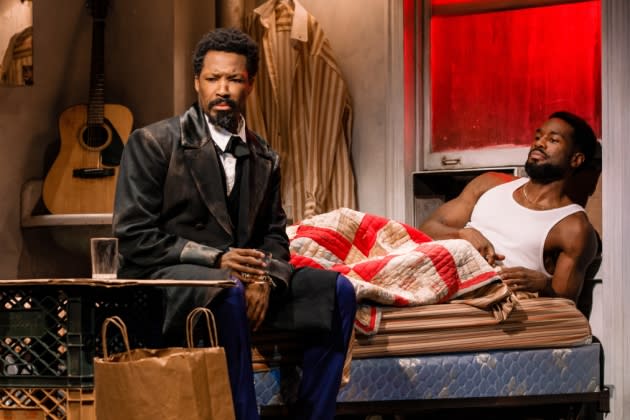‘Topdog/Underdog’ Review: Yahya Abdul-Mateen II and Corey Hawkins Star in a Live-Wire Broadway Revival of Suzan-Lori Parks’ Play

It is a testament to the acuity of Suzan-Lori Parks’ imagination and powers of perception that “Topdog/Underdog” feels as vital and electric today as it did 20 years ago. The first Broadway revival, which opened at the Golden Theatre tonight, crackles like a live wire — an American fable with its finger shoved in a socket. Throw in career-high performances from Corey Hawkins and Yahya Abdul-Mateen II, and it is a theatrical event in the most essential sense, in that it demands to be seen here and now.
The 2001 play, for which Parks became the first Black woman to win a Pulitzer Prize for Drama, has attained a towering stature in American letters over the past two decades, inspiring a generation of dramatists wrestling with race, capitalism, and their blood-stained roots in our country’s history. It’s also loose-limbed and funny and magnetically entertaining, a slow-burning display of dramatic fireworks. On the page, Parks is known for her liberal, almost sculptural, use of blank space. Under the direction of Kenny Leon, this production fills them with swagger and heart.
More from Variety
Why the Creators of Broadway's 'Topdog/Underdog' Think the Play Has a Superpower
'Aquaman' Star Yahya Abdul-Mateen II Says Acting in Movies Like 'Aquaman' Is 'Clown Work'
It’s easy to read the two brothers, named Lincoln and Booth in a mordant joke by parents who abandoned them, as allegories. They share cramped quarters in a rooming house, where their rivalry and reliance on each other ricochet off the walls. Booth, the younger, is a schemer and a dreamer, a shoplifting whiz and hapless womanizer who exemplifies the hustle — a strategy for surviving the system by gaming it. Lincoln mastered that route, but gave it up after a buddy got killed. Now, he does the “honest work” of dressing up in whiteface as the Great Emancipator, at an arcade where he rehearses his death for trigger-happy patrons. “It’s a living,” Lincoln says. “But you ain’t living,” Booth replies, and Lincoln responds, “I’m alive, ain’t I?”
They are also men of appetite, pride, and perseverance rendered in distinct detail. When Lincoln calls out the stuck-together pages of Booth’s porn rag collection, the younger replies, “If I wasn’t taking care of myself by myself, I’d be out there running around” spending money he doesn’t have and shooting people “out of a need for unresolved sexual release,” and besides — he made it with Lincoln’s ex after she dumped him because he couldn’t get it up (!). The pair rib each other, go for the jugular and retreat in a poetic rhythm that brims with the gall only shared between kin.
Both stars demonstrate nimbleness and precision that all but disappear beneath their natural ease. Every moment is totally convincing. Hawkins, a Tony nominee for “Six Degrees of Separation,” wears Lincoln’s restless resignation like the weathered frock coat in which he pantomimes his own assassination. It is a remarkable turn that integrates the character’s apparent contradictions into a wholly believable man of principles and deception. Abdul-Mateen II, who broke out in his Emmy-winning role on HBO’s “Watchmen,” makes an extraordinary Broadway debut, lending bravado and simmering resentment to Booth’s hopeful delusion. The expert sparring and jostling between the two is such a pleasure to watch, it may even lull the audience into a false sense of comfort. Brothers could go on joshing like this forever, right?
The shrewdness of the play’s insights — about history (which people like to see “unfold the way they folded it up”), desire, legacy and more — has only grown sharper with time. And they benefit from the lived-in yet grand presentation of Leon’s staging. Ornate gold curtains pull back in billows around the dingy bedroom where the brothers crowd each other, suggesting a broader, more stately context (set design is by Arnulfo Maldonado). The production feels at once like a timeless pageant and a peek through its smudged window.
There is an underside to the thrill of an overdue revival of “Topdog/Underdog” that feels so decisively plugged into the moment. It’s true that too little has changed about the system that demeans Black men, that demands hustle and consumption even as it consumes everyone in its path. It’s also true that the play distills much more than how people are shaped by social forces, burrowing into what makes them tick. It’s a time bomb that will always be ready to detonate.
Best of Variety
Sign up for Variety’s Newsletter. For the latest news, follow us on Facebook, Twitter, and Instagram.

 Yahoo News
Yahoo News 